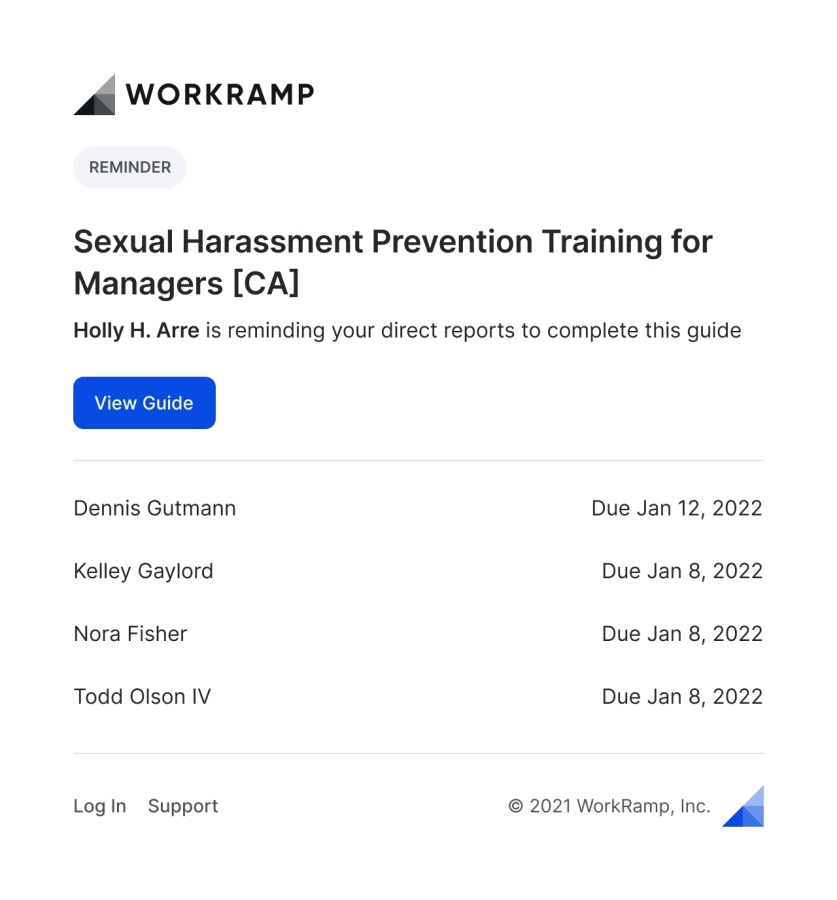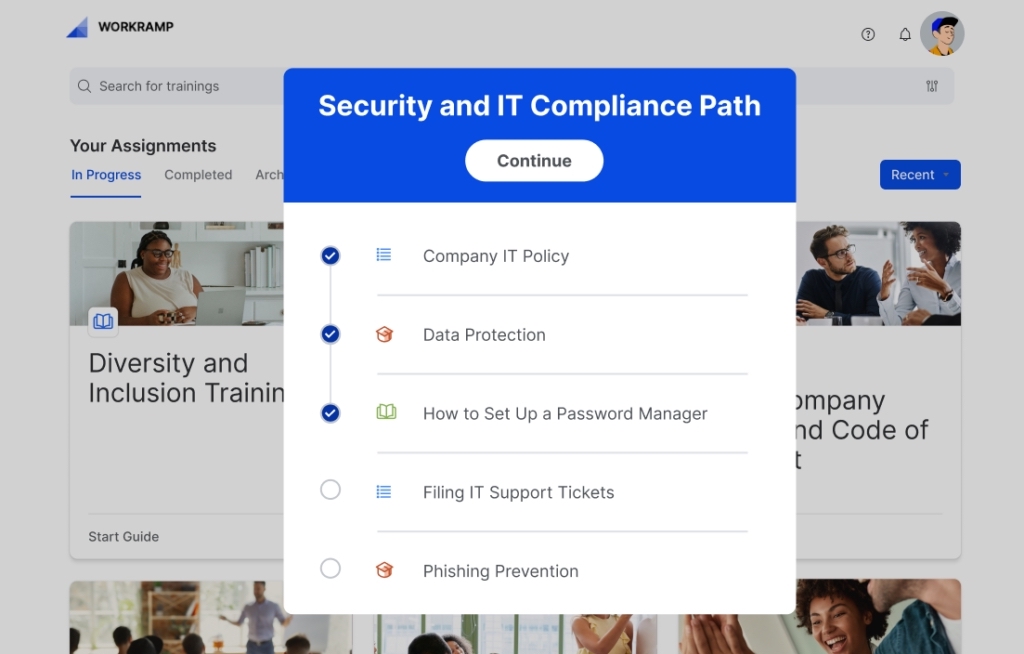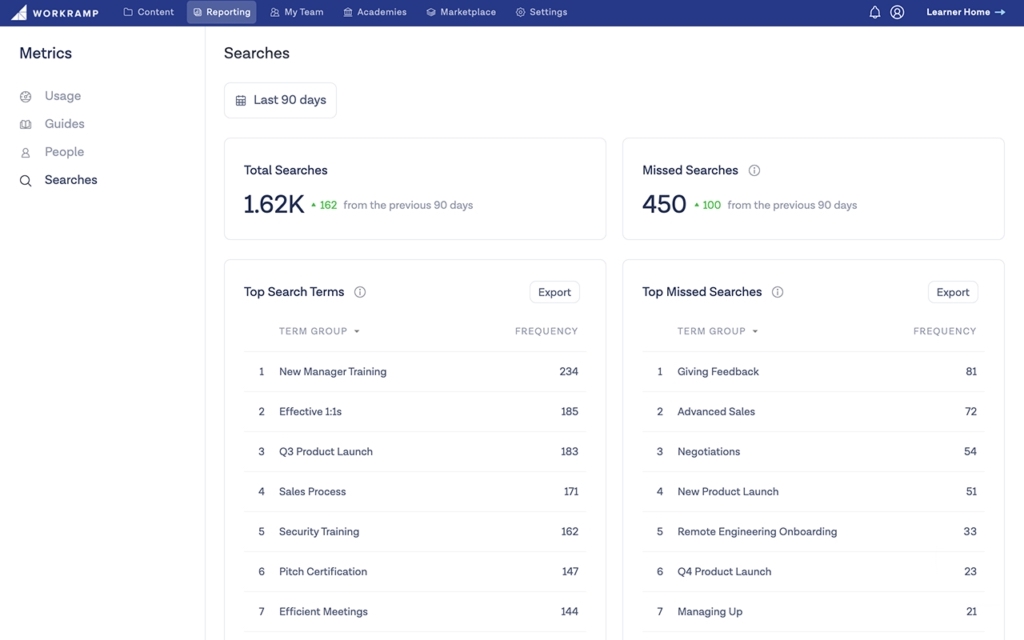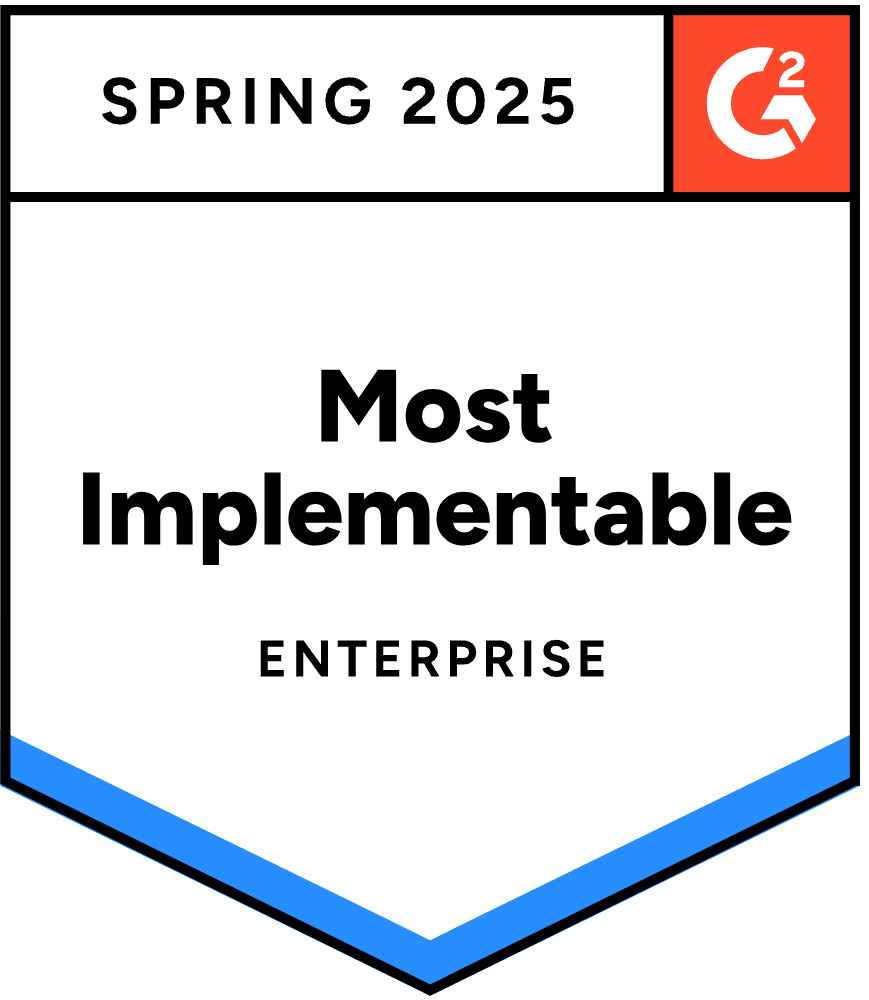11+ Best Compliance Training Software & LMS
Emily Homrok | WorkRamp Contributor
View bioLearning Tips Straight to Your Inbox
Businesses must comply with employment regulations and labor laws, including industry-specific regulations like HIPAA in the healthcare industry. Failure to comply with state or federal laws can lead to fines, legal action, and irreparable damage to your brand’s reputation and image.
Compliance is essential to avoid these types of outcomes and equip your teams with the knowledge they need to perform their roles safely, efficiently, and effectively. The challenge for businesses is finding a way to implement compliance training programs that deliver measurable results.
Compliance training software offers a solution by making it simple to design custom courses, track training progress, store important documentation, automate time-consuming tasks, and more.
Understanding why compliance training matters; what types of compliance training a software system can help you implement; and what features and functionalities you should look for in a compliance training platform can help you maintain a safe, inclusive workplace and protect your organization from costly fines and penalties.
In this post:
What is compliance training software?
No matter what industry you’re in or what services you provide, you must comply with the state and federal regulations that affect your business. It’s also essential for employees to be familiar with internal company rules, policies, and procedures.
Compliance training covers various topics and issues that deal with the employer-employee relationship, from policies around employee benefits and medical leave to federal laws prohibiting discrimination.
Digital tools, like compliance training platforms, can be used to facilitate compliance training.
Compliance training software usually refers to a learning management system or LMS. Learning management systems can be used by small, mid-sized, or large organizations to improve the quality and efficiency of compliance training initiatives—for instance, making training more engaging for learners and easier to track for managers.
What can a compliance training LMS accomplish? Using a cloud-based platform like WorkRamp, organizations can:
- Easily create, deliver, and update training content
- Automate enrollment and re-enrollment in mandatory training courses
- Create notifications and alerts to keep team members on track
- Increase the accessibility of training courses by bringing them online and making them mobile-friendly
- Accommodate a diverse range of preferred approaches to learning, such as asynchronous learning with self-paced courses
- Keep all compliance-related documentation in an organized hub that can be easily navigated for auditing purposes
- Incorporate interactivity microlearning and other strategies to improve retention of training content
An LMS enables businesses to effortlessly develop, deploy, and manage content related to compliance training, including but not limited to online courses, live webinars, quizzes, self-assessments, instructor-led classes, FAQs, and videos.
An LMS also makes it easy to track employee progress, keep tabs on upcoming deadlines, manage and organize compliance-related documents, and automate enrollment in various courses.
7 types of compliance training software
Businesses have a wide range of compliance training needs, from training and onboarding new employees to improving and increasing inclusivity on executive teams.
Software can help organizations efficiently meet a wide variety of compliance training goals and requirements, such as:
- Teaching employees about the company’s anti-harassment policies
- Helping team members understand how to keep customers’ data and personal information secure
- Equipping employees to be safe and prevent accidents on the job site
The question is, what type of training software is best for your business?
Choosing software that aligns with your organization’s needs and priorities is essential. For example, some organizations may want the ability to design and author their own custom courses, while others prefer to take advantage of prebuilt content.
Your training needs may also vary depending on your industry or learners’ specific roles and departments.
Here are seven examples of compliance training software you may benefit from using.
1. Human resources (HR) compliance training
HR compliance training aims to educate HR employees about the laws, regulations, and company policies governing different aspects of the employer-employee relationship—for example, how employee compensation should be determined or how employee grievances should be resolved.
Other topics or issues that might be addressed by HR compliance training include:
- Employee recruitment and training programs
- How employee wages and benefits should be managed
- Protecting the organization against liability
- Settling employee complaints and disputes
- What types of HR documentation need to be collected and maintained
HR compliance training teaches HR team members about company policies and ethics, enabling them to address complex workplace issues and challenges with fairness, transparency, and efficiency.
This also ensures that your organization follows state and federal laws around employee pay, benefits, maternity and paternity leave, anti-discrimination policies, workplace conflicts, and other employment-related issues.
2. Anti-harassment compliance training
In one study of over 800 respondents, over one-third—34 percent—said they had left a job because of unresolved harassment issues.
Whether it occurs in an online or physical setting, bullying, and sexual harassment create an unsafe and uncomfortable working environment. Harassment harms morale and productivity while damaging your brand’s reputation, hindering your ability to attract and retain talent, and exposing your organization to the risk of a lawsuit or legal claim.
Anti-harassment training teaches participants how to build and maintain an equitable working environment where all team members feel comfortable participating, sharing their ideas, and collaborating. It’s also an essential tool to help protect your organization from negative publicity or legal liability. Participants learn about appropriate standards for professional conduct, how to recognize and report harassment, and what constitutes retaliatory behavior after harassment is reported.
3. Health and safety compliance training
Safety training isn’t just for hazardous industries like mining or construction—it’s an essential training must-have for every type of business, from hospitals, factories, and warehouses to restaurants, laboratories, and office buildings.
Examples of subjects that may be covered in safety compliance training include:
- Fire safety
- Environmental safety
- Proper lifting techniques
- Proper use of personal protective equipment (PPE)
- Preventing of workplace violence
In the U.S., workplace health and safety regulations are enforced by the Occupational Safety and Health Administration (OSHA). According to its website, OSHA requires employers to provide a safe workplace and is applicable to most private sector employers and their workers in all 50 states.
4. Data and cybersecurity compliance training
Data privacy and cybersecurity training aren’t just for tech companies—it’s essential for any business or organization that gathers or stores sensitive information, including the personal information of its employees, customers, or other parties.
There are two reasons why it’s essential to provide this type of training for your team:
- You need to ensure that your organization is following the regulations that govern data privacy, potentially including state-specific laws like the California Privacy Rights Act (CPRA) and/or international regulations like the EU’s General Data Protection Regulation (GDPR)
- You need to limit your risk of a data breach while making sure your team is prepared to act if a breach does take place
Data and cybersecurity compliance training bring your team up to speed on data privacy regulations, which constantly evolve as technology gets more sophisticated. It also empowers employees with the technical knowledge and training to keep you and your customers’ data safe from malware, phishing, and other security threats.
For example, some topics or issues that might be covered include:
- Awareness of email scams and other security risks
- Password and username security
- What to do if a company-issued phone or computer is lost or stolen
5. Diversity and inclusion compliance training
Diversity and inclusion training aims to help employees become aware of and avoid acting upon any biased beliefs or stereotypes they hold based on race, gender, physical ability, sexual orientation, or cultural practices and beliefs.
This training educates learners about recognizing, preventing, and eliminating harassment and discrimination while building a culture that welcomes everyone.
According to BuiltIn, companies with highly diverse teams noticed a significant increase in cash flow—to the tune of 2.5x per employee. The research also noted that top-quartile companies for racial and ethnic diversity are 36 percent more likely to outperform fourth-quartile companies.
Diversity is also vital for building effective, engaged teams who are highly motivated to perform. For example, a survey by CNBC found that approximately 80 percent of workers say that they want to work for a company that values diversity, equity, and inclusion.
Meanwhile, research from McKinsey shows that when employees feel included, they become about 3x likelier than their coworkers to feel excited by and committed to the organization’s mission. In other words, inclusivity drives employee engagement.
By actively fostering a culture of diversity and inclusion, organizations can attract top talent and increase profitability. Learn how to build inclusive learning programs and boost inclusivity through employee resource groups.
6. HIPAA compliance training
HIPAA, which refers to the Health Insurance Portability and Accountability Act of 1996, is a federal law that applies to organizations categorized as covered entities. According to the Department of Health and Human Services (HHS), which provides a helpful overview of HIPAA here, covered entities include health plans, healthcare clearinghouses, and… healthcare providers that conduct certain healthcare transactions [like billing] electronically.
As the CDC explains, HIPAA was created to protect sensitive patient health information from being disclosed without the patient’s consent or knowledge. HIPAA compliance training, which must be provided as part of new employee onboarding, reduces the risk of HIPAA violations and empowers your team with the expertise they need to succeed in healthcare-related roles.
If your organization handles medical records or other patient information, your team may require not only HIPAA compliance training but additional training around other healthcare-specific laws and regulations, such as the Physician Self-Referral Law (also called “the Stark Law”).
7. Other Regulatory Compliance Training
HIPAA, which impacts healthcare organizations, is just one example of industry-specific regulations. Depending on what type of product or service you provide, numerous other laws could impact your business.
For example, the banking and financial industry is impacted by regulations like the Fair and Accurate Credit Transactions (FACT) Act and the Sarbanes-Oxley Act. In the construction industry, organizations need to be aware of and compliant with environmental protection laws like the Toxic Substances Control Act (TSCA) and Resource Conservation and Recovery Act (RCRA). And in the food and beverage industry, businesses must comply with food safety regulations like the Food Safety Modernization Act (FSMA).
In addition to following industry-specific regulations, there are numerous labor laws that all types of businesses must comply with. For instance, all U.S. businesses with at least 15 employees are subject to Title VII of the Civil Rights Act of 1991, which bans job discrimination based on race, skin color, religion, sex, or national origin.
What is the importance of compliance training for businesses?
You’ve already learned about a few different types of compliance training and some of the benefits these types of training can deliver. For instance, if you’re an insurance or healthcare provider, you need to ensure that your team stays up-to-date on HIPAA regulations to ensure that patient records are collected, maintained, and shared following proper protocols—otherwise, you could face costly fines or even legal action.
Here are four more reasons why effective compliance training is not only helpful but essential for businesses to implement:
- Compliance training minimizes your exposure to legal risk and liability
- Compliance training boosts employee engagement, efficiency, and productivity
- Compliance training lays the foundation for a better company culture
- Compliance training mitigates the risk of costly human errors that affect your brand image—and your bottom line
Let’s review how organizations can achieve these outcomes using compliance training software.
Reduced legal risk
Failure to comply with employment laws and safety regulations, such as the Family and Medical Leave Act (FMLA) or the Fair Labor Standards Act (FLSA), opens the doorway to legal liability—and with it, costly penalties. In addition to being expensive, a fine or lawsuit could seriously hurt your brand’s reputation and hamper your organization’s ability to grow.
Compliance training helps you mitigate legal and financial risks by ensuring your team members are continuously educated about the newest laws and standards that your business is subject to—from storing customer data securely to operating construction machinery safely to preventing racial discrimination and sexual harassment in the workplace. A flexible platform like the Learning Cloud makes it easy to deliver all types of compliance training content—and with automated enrollment and re-enrollment, you’ll never have to waste time tracking down what needs to be completed.
Improved company culture
From how your team members communicate to how engaged and productive they are, company culture impacts every aspect of your daily operations and your long-term success as an organization.
By providing effective compliance training, you can build a strong company culture where inclusivity, employee well-being, and continuous learning are highly valued.
Data shows that when employees feel included, their sense of ownership, accountability, and engagement increases, along with employee loyalty and retention. That means more talent stays inside your organization, your hiring and recruitment costs decrease, and your team members feel more motivated to continue learning and improving.
Increased engagement and completion rates
Forbes defines employee engagement as the emotional commitment the employee has to the organization and its goals. Gallup phrases it slightly differently, defining engagement as the involvement and enthusiasm of employees in their work and workplace.
Whether you define it as enthusiasm, emotional commitment, or something else, one fact is clear: higher engagement produces better business outcomes. For example, increased engagement has been linked to lower employee turnover, which means better team morale and lower hiring costs.
WorkRamp’s employee training LMS levels up your team’s engagement by enabling you to create fun, useful training content that’s tailored to each learner’s job role or industry.
Reduced human error
Whether the topic is data storage or job site safety, compliance training helps ensure that all your team members know the latest standards, practices, and regulations affecting your industry. That’s crucial not only from a legal and safety standpoint but also for the financial health of your business.
According to research by IBM, inaccurate data translates to economic losses exceeding $3 trillion annually in the U.S. alone. More recent data indicates that human errors are responsible for nearly half of all disruptions to business.
While human errors are costly, they can be minimized by using an LMS like the Learning Cloud to deliver top-notch compliance training.
Best compliance training software
What are some of the best compliance training software options? It can be hard to narrow down the options, but these LMS platforms are a great place to start.
1. WorkRamp
The Learning Cloud is one of the best compliance LMS options available because it not only makes it easy to create engaging, high-quality compliance training, but it also includes essential tracking that allows you to follow up with employees who haven’t yet finished the training and provide required compliance training reports.
In addition to these benefits, the Learning Cloud can serve as the foundation for all of your training initiatives, from sales enablement to employee development to vendor education. A variety of integrations that work seamlessly with your current tech stack and reporting allows you to showcase the value of training to the company’s bottom line.
Key Features:
- The easy-to-use interface makes it easy to create essential compliance training and improves course completion and engagement rates
- Best-in-class course authoring tools, including AI Assist
- Custom branding capabilities for employee- and customer-facing portals to provide a seamless, up-leveled experience for course developers and learners
- Engage learners with blended learning capabilities, including video, text, quizzes, and live events
- High-quality integration with sales and support software, HR platforms, communication and scheduling tools, identity and SSO software, and more
- Advanced reporting shows not only completion rates and scores but also the ROI of learning programs
Contact us to get a demonstration of the Learning Cloud today!
2. Absorb LMS
Absorb LMS is part of the Absorb suite of products. In order to use microlearning, create content and courses, and analyze results, you’d also need subscriptions to the rest of the products in the suite.
Key Features:
- Learners are connected to relevant content they need through AI
- Compliance and other training available on mobile devices
- Automated course reminders to ensure compliance training goals are met
- Basic reporting and analytics (more available with Absorb Analyze add-on)
- Customizable to match your company’s brand and meet your training needs
The Absorb LMS option is scalable and easy to use, but you’ll need additional subscriptions to create an all-in-one experience where your team can create courses, run detailed reports, and more.
3. 360Learning
360Learning allows your team members to provide in-house expertise for your L&D team. This can be very helpful when creating compliance training, as the compliance and legal experts in your organization can help ensure the training is accurate and meets requirements. Creating training is simple, and add-ons are available for skill-based learning, AI authoring assistance, and more.
Key Features:
- It’s easy to create e-learning courses, even without a training background, which is helpful when your compliance experts lead the development
- Content can be translated into multiple languages
- Your team can efficiently create and deliver training and analyze the results
- External tools are available to create engaging course content
- More 360Learning tools are available to integrate additional capabilities
There aren’t very many compliance-specific features in 360Learning, but the platform makes it easy to draw in the expertise of your in-house team.
4. iSpring Learn
iSpring Learn allows you to create interactive courses, video lessons, and even role-plays to reinforce compliance concepts in a fun, engaging way. You can assign the training to employees, measure results, and follow up to ensure compliance training is complete. You can also use iSpring for other training purposes such as upskilling, sales training, and more.
Key Features:
- Existing content can be uploaded, including formats ranging from SCORM to MP4 and MP3 to PPT
- Assign and track compliance training by creating groups or by assigning courses to individuals
- Training can be created in multiple languages
- Create courses that are accessible on mobile devices and use gamification to increase engagement
- Get clear reporting on compliance training results that can be used to follow up and prove compliance in case of an audit
- Customize the platform for a branded experience for all learners
iSpring Learn is a powerful platform for small businesses and offers excellent support. However, you won’t get a feature-rich or high-customization experience, so if you need a robust LMS to serve multiple purposes, another option might be better.
5. TalentLMS
TalentLMS is easy to use “right out of the box,” requiring less customization or setup than most other options. Learners can access courses on demand and using multiple devices, so there’s no excuse not to complete compliance training. Courses can also be localized to a user’s language and your company’s brand design.
Key Features:
- User-friendly and easy to customize to match your brand
- Get up and running quickly
- TalentLMS can be used for multiple training types, including employee development and customer education, along with compliance training
- The TalentLibrary subscription gives your team access to ready-built short courses that are 15 minutes or less
For a small team that needs an immediate learning solution, TalentLMS can be a good fit.
6. Litmos
Litmos is another platform that your team can deploy quickly, and it includes built-in integrations and an open API. Reporting is easy to use, allowing you to track compliance training completion to ensure the company meets regulatory requirements.
Key Features:
- SCORM authoring is built in and allows your team to create courses in a wide range of languages
- Litmos supports instructor-led and on-demand learning options and includes a variety of features for engaging courses, such as video assessments, gamification, customized learning paths, and more
- Pre-built training courses are available in a variety of skills, such as leadership and communication, making Litmos a useful LMS for employee development as well as compliance
While Litmos is a robust platform, some users say they’ve had to teach themselves how to use the various features. Also, some users say that when there are a wide variety of courses in Litmos, it’s difficult for learners to find the ones they need.
7. Adobe Learning Manager
If you want compliance training to run within your organization’s internal website, Adobe Learning Manager could be a great solution. This platform supports a variety of training types, including customer education and employee development, as well as compliance training.
Key Features:
- Learning content management and course authoring tools are included in Learning Manager
- Create personalized learning experiences using machine learning and AI
- Use learning paths and training auto-assign features to ensure each employee completes all required compliance training
- Take advantage of features like points and badges to encourage learners to finish compliance training early
Adobe Learning Manager is highly customizable, which means there’s a significant learning curve. There are a variety of user permission settings, so learners can only access exactly what they need. However, this option requires you to host the training on your internal website or a company app.
8. EdApp
EdApp is a mobile-first compliance LMS that is focused on delivering microlearning. If you’re looking for a low-cost delivery system for bite-sized learning, EdApp could be a great fit. It’s easy to use, personalize, and track completions.
Key Features:
- A free plan option
- Extensive starting library of premade content
- AI course creator tool
- Mobile- and microlearning-focused
- Create engaging, fun courses with available gamification, spaced repetitions, and push notifications to maximize completion rates
EdApp does not have any built-in integrations, so it won’t be a good solution for those who need to link their LMS to their tech stack. But if you’re looking for a quick, easy-to-use, mobile-based LMS, EdApp is worth exploring.
9. LearnUpon
The LearnUpon compliance LMS offers an engaging, enjoyable user experience for the L&D team as well as for learners. AI-powered learning and automated user management make it easy to train compliance at scale, and organizations can centralize course creation, delivery, and tracking.
Key Features:
- Automated user creation and enrollment
- Unique learning portals make LearnUpon helpful for multiple learning audiences
- Create on-demand compliance training your team can access anywhere
- AI chat within the course makes training engaging and helps learners reflect on what they’ve learned
- High-quality reporting and integrations make it easy to track course completion and manage adherence
With LearnUpon you can launch training programs quickly, and a Knowledge Base gives users access to common Q&As. If your organization is large, with over a thousand learners, you won’t find the bulk update features you might need.
10. ProProfs Training Maker
ProProfs Training Maker, as the name suggests, allows you to quickly and easily create engaging training courses. The platform also comes with over 100 prebuilt courses created by experts that you can customize to your organization. ProProfs supports hybrid learning and includes over 70 languages.
Key Features:
- Allows multiple instructors per course so in-house experts can weigh in on compliance issues and give real-world examples
- Create courses quickly and easily with existing media or using prebuilt templates
- A virtual classroom allows an unlimited number of learners at once
- Create searchable manuals and knowledge bases so your teams are aware of compliance rules and requirements for every situation
- Track how learners perform based on groups, roles, or other criteria to ensure compliance training is completed accurately and on time
While ProProfs makes creating training modules easy and fast, the platform focuses on basic features without many integrations. If that’s a concern, you might want to look at a different solution.
11. Moodle
Moodle Workplace is an enterprise compliance LMS with a lot of features and integrations to make it easy to fit into any tech stack. The company’s long history in learning technology means the platform is focused on what works best for learners and for course builders.
Key Features:
- Create individualized learning journeys so each team gets the exact compliance training they need
- An option to create unique learner portals for each department
- A wide range of integrations and plugins allow you to customize the platform and link it with the rest of your tech stack
- Built-in automated compliance recertification
- Track course completions and learner grades
Customers love the flexibility and customized learning paths but also say that customizing themes is difficult, and the large array of features makes the platform complex.
8 essential features of compliance training software
Do you want to limit your legal liability, minimize human errors, increase your team’s engagement, and build a better company culture? If your answer is yes, then it’s imperative for your organization to provide effective compliance training for team members.
Compliance training software can help you meet that challenge successfully—but only if it offers the necessary features and functions.
For HR managers and L&D leaders, that raises an important question: what features and capabilities should you be looking for in compliance training software?
For example:
- Will the solution be scalable as your organization grows?
- Does it provide actionable insights by offering data analytics and reporting?
- Will remote or WFH employees be able to access the platform on mobile devices?
Discover the must-have features for the best compliance training software, from automated workflows to social learning and interactivity.
1. Automated workflows

Look for a platform like WorkRamp that lets you easily automate workflows, training, retraining, and course tracking.
With the Learning Cloud, you can automate course authoring, course enrollment, and course re-enrollment and send automatic notifications and alerts to employees. Automation also makes it simple to compile, organize, and locate the documents you need to maintain compliance, providing you with a secure way to access each employee’s training history.
By harnessing the power of automation, you can make compliance training faster, more cost-efficient, and more organized.
2. Various course options
Organizations have different compliance training needs. For instance, restaurants need to cover topics like food safety, while hospitals need to cover topics like patient record privacy and the proper disposal of medical waste. Employees also have different training needs depending on their roles, responsibilities, and experience level. That means you’ll need a platform that gives you options for designing and delivering courses.
The Learning Cloud offers an all-in-one, turnkey solution with the flexibility and versatility your team needs. You can use the drag-and-drop course creation tool to develop tailor-made learning experiences, incorporating videos, quizzes, infographics, screen captures, and more.
3. Tracks compliance requirements and identifies training gaps

Say goodbye to confusing spreadsheets or manual tracking systems: with the right LMS, you can keep track of compliance requirements, course progress, and completion rates in real-time effortlessly.
The Learning Cloud makes it easy to know when deadlines are approaching, see employees’ progress on training courses, and spot knowledge or skill gaps that need to be filled.
4. Scalable learning
You need an online compliance training platform that’s capable of growing with you, even when you’re going through a period of hypergrowth. It’s important to choose an LMS that offers a scalable compliance solution.
WorkRamp’s platform is designed to help you build training materials and instructional content at scale. You can easily standardize language and terminology, assign content creation to teams, and deliver an exceptional experience for both learners and admins—no matter how quickly your team is expanding.
5. Cloud-based and mobile access
The way businesses operate has radically changed since the COVID-19 pandemic, with almost 13 percent of employees now working from home and over 28 percent working on a hybrid WFH/in-office basis.
With the shift toward remote work, businesses need to adapt by making training materials accessible online, including a mobile-friendly design that lets employees learn on the go.
Using a mobile-friendly, cloud-based platform eliminates the friction and inefficiency of traditional training, like differences in time zones or the need to travel to job training sites.
With the Learning Cloud and mobile learning, employees can learn on their own schedule by accessing online training resources like video conferencing, message boards, how-to guides, and interactive lessons.
6. Interactivity and social learning
Interactive features are important in an LMS because they enhance learner engagement, leading to better knowledge retention and increased motivation to continue learning. Look for a learning platform with interactive features like Challenges, quizzes, scorecards, roleplay, and more.
Social learning describes learning that occurs by observing others—not just in person but also in a virtual environment. Examples of social learning include chat groups or discussion boards, like a dedicated Slack channel where employees can share and discuss what they’re learning. Other social learning examples include virtual coaching, roleplays, and two-way chat functionality.
7. Analytics and reporting

Analytics and reporting features are essential to track learner progress and determine the ROI of your training programs. WorkRamp’s platform features advanced data reporting and analytics, enabling you to see which team members have completed training and how learners are progressing.
With built-in reporting and analytics tools, it’s easy to monitor course completion rates and determine whether your training programs are delivering the expected outcomes. With data-driven insights, you can make strategic, efficient decisions that take your business forward faster.
8. Certification and retraining opportunities
Some employees need special certifications to be compliant with regulations. An LMS like WorkRamp makes it simple to track which certifications your employees need and when future recertification or retraining is required.
No matter what industry you’re in or what your organization’s targets look like, compliance training enables learners to develop the critical skills and knowledge they need to perform safely and successfully in their roles. That makes it easier to avoid legal risks, reach your organizational goals faster, and achieve better business outcomes. However, it’s essential to choose the right software to assist you.
Use the best compliance training software
Compliance training is about more than just protecting your business against risks and liabilities—it’s about positioning your organization for long-term success. That’s why you need a powerful digital platform to manage and streamline your training efforts.
The Learning Cloud is packed with features that take your compliance training further, including:
- Robust data reporting capabilities
- Event scheduling and group management features
- Automated workflows
- User-friendly, mobile-friendly interface
- eSignature verification
- Certification and recertification options
- Real-time dashboards
- Microlearning, social learning, and interactivity
- Compliance tracking
Get the edge you need to compete and become an industry-leading innovator.
Contact us to schedule a free, personalized demo and discover the Learning Cloud can enhance your compliance training programs.
Complete the form for a custom demo.
Recent Posts
- Introducing WorkRamp Analytics Studio: Unlocking Your Data Insights with AI June 30, 2025
- 11 AI LMS for AI-Powered Learning June 27, 2025
- The Best LMS Platforms for Customer Retention (2025 Guide) June 27, 2025
- 11 Best AI Learning Platforms June 16, 2025
- Top AI LMS Features (and Why They Matter in 2025) June 16, 2025
Emily Homrok
WorkRamp ContributorYou might also like
What are the benefits of online learning?
When it comes to professional development and continued learning, online courses and programs offer several advantages over traditional in-person options.
Read More
Create engaging eLearning content for your teams
eLearning gives organizations the flexibility that other online courses can offer, but creating courses that are engaging and impactful can be harder than you think.
Read More
Find the best LMS to empower employees, customers, and partners
Learning management systems, or LMSs, are an indispensable tool for increasing team productivity and effectiveness. But with multiple platforms, the key lies in choosing the right one, as not all LMS are created equal.
Read More
Decrease Ramp Time and Increase Revenue
Get in touch to learn how WorkRamp can help you achieve your learning and development goals.
Request a Demo




